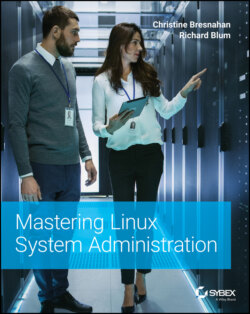Читать книгу Mastering Linux System Administration - Richard Blum - Страница 64
SOFTWARE VERSIONS
ОглавлениеThe Linux distribution developers work hard to make sure package versions added to the repositories don't conflict with one another. Usually it's safest to upgrade or install a software package from the repository. Even if a newer version is available elsewhere, you may want to hold off installing it until that version is available in your Linux distribution's repository.
When you look at the file, you'll notice that it's full of helpful comments and warnings. The repository sources specified use the following structure:
deb (or deb-src) address distribution_name package_type_list
The deb or deb‐src value indicates the software package type. The deb value indicates it is a source of compiled programs, whereas the deb‐src value indicates it is a source of source code.
The address entry is the software repository's web address. The distribution_name entry is the name of this particular software repository's distribution's version. In the example, the distribution name is focal. This does not necessarily mean that the distribution you are running is Ubuntu's Focal Fossa; it just means the Linux distribution is using the Ubuntu Focal Fossa software repositories. For example, in Linux Mint's sources.list file, you will see a mix of Linux Mint and Ubuntu software repositories.
Finally, the package_type_list entry may be more than one word and indicates what type of packages the repository has in it. For example, you may see values such as main, restricted, universe, or partner.
When you need to add a software repository to your sources file, you can try to wing it yourself, but that more than likely will cause problems. Often, software repository sites or various package developer sites will have an exact line of text that you can copy from their website and paste into your sources.list file. It's best to choose the safer route and just copy and paste.
The front‐end interface, apt, provides intelligent command‐line options for working with the Debian‐based dpkg utility.
